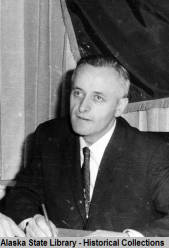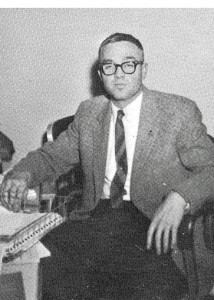In January of 1966, I returned to Anchorage after a semester of graduate school at Oklahoma State University. According to OSU’s catalog, their department of Clothing, Textiles and Merchandising had courses in design, but when I arrived design had been eliminated.
I had two small grants, however, which persuaded me to stay, The cotton industry grant I discovered involved testing a variety of cotton weaves; my job was to change the sheets on students’ beds while my supervisor, a grim faced, white-haired spinster tallied figures. If I’d been working on an oil rig, I couldn’t have been further from my dreams of dress design.
Back in Anchorage, I applied for work everywhere, but the job outlook was as bleak as winter. Mom tried to cheer me up, dragging my gloomy self to movies and to window-shop at places like Welches and Smart Shop and Theresa’s, Anchorage’s nod to stylish fashion and quality clothing.

One gray Sunday, Mom saw a listing in the newspaper for a new movie. When Dad dropped us off at the Fourth Avenue Theater, the sidewalk in front was empty and the box office closed. Mom had misread the time and we were an hour early, so we walked a few blocks to the Captain Cook Hotel’s coffee shop.
The Whale’s Tail had curved banquets and one of the nicest counters I’d seen. With its subdued lighting, the atmosphere was relaxing and posh, even elegant, compared to other coffee shops in town.
When we entered, three men in business suits were chatting in a booth directly ahead. I immediately recognized Jim Irany who taught sociology at the University of Alaska where I’d graduated the previous spring. Short and swarthy with a genial expression, he clearly liked people. Students called him simply Irany. When he waved me over, Mom headed for the counter, gesturing for me to go ahead.
After a bit of small talk, he asked what I was doing. I mentioned graduate school then said I was looking for a job. He looked pleased. “I’ve opened an Anchorage office for the Department of Economic Development for Governor Egan.” Then he said, “I’m looking for a receptionist/secretary.”
Oh boy. I nodded encouragingly.
“There’ll be some typing and dictation…” Seeing the doubt on my face, he added, “Shorthand isn’t necessary.”
Whew.
“Think you’d be interested?”
“Sure, yes!” I was stunned by this sudden turn of events.
“Good. Can you start Monday, say 8:30?”
Yes, absolutely, hallelujah, hurray! I nodded, beaming at him and his colleagues, who’d been observing our interchange with interest.
Back at the counter, I don’t remember what we ate. As for the movie, I wish I could tell you what it was.
Come Monday, I discovered Irany’s office was just down the hall from John Hellenthal’s office. Hellenthal was my aunt’s attorney and one of the best-known lawyers in Anchorage. He and Irany were pals and in the coming months, he frequently wandered into our office to visit, sometimes carrying a fifth of something or other to ask if I’d run down to the corner coffee shop for ice.
It took the State of Alaska six weeks to issue my first paycheck. Around week four, Irany, noting my sour face, asked if I’d been paid yet. No I said. Shaking his head in disgust, he pulled out his wallet and handed me a bill. “Will this tie you over?”
“Well, that was generous of him,” Mom said as we stared at the $100 bill. I’d never seen one before. I had a coat on layaway and this loan was immensely cheering.
One of Irany’s tasks was to write a speech for Governor Egan to give to a local business group. A week later, Irany and I walked a few blocks over to The Woodshed on Third Avenue. It was a lunch meeting — maybe Rotary — for forty or fifty, mainly men. Since I carried the speech, I was seated next to the Governor. There was no space on the table — already crammed with food — and I didn’t want to put the manila envelope on the floor, so I sat on it. When it was time for Egan to speak, I handed him one nicely butt warmed page at a time.
Spring turned into summer, the air turned balmy and the days lengthened. When we left the office around five, the sky was so light, it looked like noon. Every Friday afternoon, Irany’s blond fiancé came by and the three of us – joined by one or two others — would go for a drink at The 515 Club or other watering hole.
People I otherwise would never have met came through our office. Through the tall, handsome Chris Von Imhoff, Director of Tourism for Alaska, I met Elaine Atwood, heir to the Anchorage Times. One evening after work, a friend and I joined Chris and Elaine at The Woodshed. She was taller than I was, infinitely blonder and wore a white sheath-style dress and carried no handbag. I wondered where she kept her keys, money, etc. She didn’t seem to have anyone trailing behind with her things.
“Are you a stewardess?” she asked, casting a look at my black linen suit, which I’d worn with a gold pin designed by Ron Senungetuk.
“No, why?” I was surprised. This was my best suit, made from a Vogue pattern no less. I suppose it was a little sober next to her blazing white.
“What you’re wearing, I thought you were a stewardess.”
Then she waved to a group heading upstairs and disappeared for the rest of the evening.
Later, when I described the evening to my parents, they were amused, especially Dad. He’d worked on the Atwood home and Evangeline, the Atwood matriarch, often came out to talk.

Then there was William Dickson, Dean of the College of Business, Economics and Government at UAF. His photograph in the 1964 yearbook is accompanied by Robert Service’s poem, RAISING THE FLAG. It begins with the words: Fine clad and arrogant of manner…
This was a fairly accurate metaphor. A handsome man, with prematurely silver hair, Dickson’s non-smiling urbanity and sophistication intimidated me no end when I’d interviewed him the previous year for the campus newspaper, The Polar Star.
Dickson was on Governor Egan’s Employment Advisory Commission and frequently in Anchorage. That summer, Labor Union Leader, Henry Hedberg, invited him and my charismatic boss to a meet and greet with Anchorage’s political and business movers and shakers.
When Irany showed me the invitation to the event at the Hedberg home — one of Anchorage’s few contemporary and architecturally designed houses — I casually let it slip that I had dated Dennis, Henry’s youngest son. That is, until Dennis abruptly left me to marry, well, someone else.
Irany’s eyebrows rose and he leaned forward. So I went on to tell him that a few years ago Henry Hedberg had enraged my father over something or other, prompting Dad to write a quarrelsome letter to the editor of the Anchorage Daily Times, in which Dad called Hedberg a communist. Mom, having hoped to one day be Dennis’s mother-in-law, was horrified.
Irany shook his head, smiling.
The following Saturday evening, Dean Dickson picked me up in his car. For the occasion, (and with a nod to Elaine) I’d smartened up with not-for-the-office high heels and a sleeveless white sheath with black buttons.
If Dennis’s father was disconcerted when I — daughter of his nemesis — entered his spacious house that sunny evening with Dean Dickson — a key invitee — he didn’t show it beyond a fleeting glare. Surrounded by so many of Alaska’s power brokers, I was soon easily invisible.
As for Dennis, he and his wife hovered and I occasionally caught him smiling.
After Dickson drove me home that evening and stopped the car, he said abruptly, “You’re not a loser, you know. You’re a winner.”
I was speechless. Where did that come from? Had Irany embellished the tale of my broken romance to convince Dickson (who never would have done so otherwise) to take me to this event?
If so, fine. I got to see a cool house and rub elbows with those who were usually just names in newspapers. Furthermore, I looked pretty good doing it.
As I was trying to come up with a reply, Dickson added, “You can’t live here with your parents.” His voice was firm, in the role of advisor. “You need to get your own apartment.”
Well, sure, that’s what I wanted, but it took funds I didn’t have.
According to the song Autumn Leaves all good things must end one day, they did. When our two-term Governor lost the election, most of us hired by him were replaced.
Irany, however, was like God when it came to contacts. He arranged an interview for me with the Alaska State School District’s Superintendent of Schools. There was zero demand for home economics teachers in the Anchorage School District, but a position with the State School Borough unexpectedly appeared at Elmendorf AFB when that teacher’s husband was transferred.
So there I was, a teacher, just what I had tried so hard to avoid.
My mother, a former teacher, was thrilled and Dad smiled and everyone said I was lucky to slide into a job so quickly. I tried, but quietly failed to see it that way.
Teaching seemed as far from design as studying cotton weaves. Now I’d become firm-mouthed, dictatorial and matronly– with a stomach. I’d get boringly practical, which meant giving up my pie-in-the-sky dreams.
There was another problem. I had spoken only once before a large group and, while preparing for that, I was almost suicidal with terror. Now I’d have to address (and control!) six classes of 30 to 40 kids each, every day, five days a week.
Oh hell, buck up, I finally said to myself.
At least now I could get an apartment.
Jan (Petri) Harper Haines was born in Sitka, Alaska and is Athabascan, Irish and Russian. In 1990 she began gathering the stories told by her mother and grandmother about their lives on the Yukon. Her book "Cold River Spirits" grew out of these early stories. Jan’s short stories have appeared in literary publications and magazines. She is a graduate of Anchorage High School (West), and earned a bachelor’s degree from the University of Alaska-Fairbanks. She is a former secondary education teacher, and had a twenty-year career in advertising and marketing.
Jan lives in Marin County, California with her husband, and often visits Alaska.




